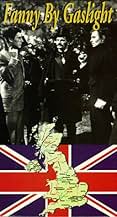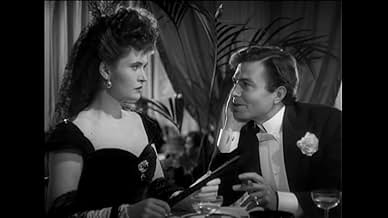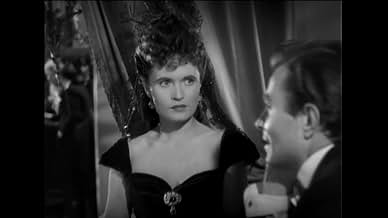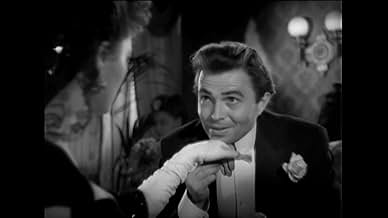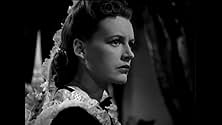Ajouter une intrigue dans votre langueFanny's father dies in a fight. Her family runs a brothel. Her real father is a politician. She falls for his advisor Harry. Lord Manderstoke's interference causes conflicts between classes.... Tout lireFanny's father dies in a fight. Her family runs a brothel. Her real father is a politician. She falls for his advisor Harry. Lord Manderstoke's interference causes conflicts between classes. Tragic events occur due to the Lord's schemes.Fanny's father dies in a fight. Her family runs a brothel. Her real father is a politician. She falls for his advisor Harry. Lord Manderstoke's interference causes conflicts between classes. Tragic events occur due to the Lord's schemes.
- Director
- Writers
- Stars
- Maid
- (uncredited)
Avis en vedette
In many ways, FANNY comes straight out of Victorian melodrama. The hypocrisy of Victorian England as essayed in Dickens and Conan Doyle is rife here: the delicate pattern of respectability is shown to be infinitely fragile. This is why the accumulation of Fanny's traumas is so plausible - one toppling domino of the edifice of respectability leads to a complete and far-reaching collapse.
The result is a failure of patriarchy, an oppression split against itself. Look at the frightening scene where Fanny's 'real' father is shown in splintered mirror reflection - the pressure turns him, Jekyll-and-Hyde-like, from a feckless, passive fraud, into a figure from a horror film, as he foresees his own death, the only option to his self-created web of deceit (wow, you really do get into it!). Fanny's first family home stands over her supposed father's burlesque house, home to many of the Victorian great and good. The fact that she has two fathers emphasises this pervasive dichotomy.
Women, in this double world, have only two options open to them, and they have a rotten deal in both. If they try to live with integrity and decency, like Fanny, they are buffeted, nay fairly walloped by a most malevolent Fate (or the workings of a corrupt social machination, whatever you want to call it). Fanny's swoonings are less conventional Victoriana than blows dealt by forces beyond her.
If, on the other hand, women transgress, like Lucy, or her father's wife (both, appropriately, if cheerfully xenophobically, linked to Frenchness), they are equally vulnerable to caprice, as their lovers turn against them, or abandon them. The film is also very good on how the idea of 'woman' is constructed in patriarchal society - there are many elaborate scenes of dressing and undressing, distortions of 'natural' femininity. Class construction is analysed too, also limiting and defeating men.
The title of the film might seem oblique, or merely atmospheric, until we note all the gaslamps standing suggestively between characters; part of a wider phallic plot, seen most interestingly, less obviously, between Stewart Granger and James Mason. Mason is perversely the most sympathetic character in the film. I say perversely, because, for the first hour and a half, he is a real monster, a glorious, diabolical, handsome, unredeemably vicious, incredibly sexy monster, who clearly has the filthiest, and most elaborate, Sadean sex ever. He is the ultimate transgressor, taboo in both the Underworld and respectable society, the two being complicit in the same corrupting system. He is only on screen in annoyingly , if appropriately brief, spurts - the first fifteen minutes of the film is electrifying entertainment. He is an aristocrat, locus of all the fears, yet desires (and 1940s British women worshipped him) of the British middle classes.
But when he goes to France - as all four protagonists do: it is a site of freedom from the ubiquitous repression of Britain, but also the ultimate venue of closure where everything is fatally brought to a head - he becomes a much more understandable, tragic figure. We see he has been demonised by respectable society as a demonic Id that must be cast out. His reduction from malevolent swaggerer to simian depressive is a shock to behold. His forcing of the duel is less a matter of honour than a poignant wishing for death. Mason is outstanding, turning a potential caricature into a figure of far greater depth. He is the Fassbinder hero of this melodrama, the tormented transgressor; not the two protagonists, whose desire for conventionality will only replicate the system that tortured them in the first place.
What is finally remarkable about the film is how these issues managed to get aired at the height of World War II. Gainsborough films were by far the most popular among British audiences at a time when duty, austerity, self-denial was mandatory. These films, and especially FANNY, by contrast, became the focus of all those repressed desires - a dissatiafaciton with authority and patriarchy; the thrill of (particularly female) transgression; the impulse to excess; a rejection of duty and tradition; all the things in real life audience members were supposed to be defending. Is it any surprise Labour got in the following year? That is why the films, beyond their stereotypical melodrama, remain enduringly fascinating. Just more James Mason, please...mmm.
'Fanny By Gaslight' does try - it manages to get subject matter into it that must have seemed very daring in the 1940s, it starts well and grows into some good scenes between Fanny ('only Hooper') and her employer's wife. Then - perhaps because of Granger, IMO - it starts to backfire badly and become a bore. A great disappointment.
Adapted from a hit novel of the day, its story, set in late 19th century London revolves around young Fanny, Phyllis Calvert, in another of her do-gooder period-roles, who we first see as a child and who it's fair to say, enjoys an unconventional childhood. Not only do her parents unbeknownst to her run a brothel for high-society gents, but she loses both her father and mother in a short period of time, the former at the hands of James Mason's truculent Lord Manderstroke. Years later, now a young adult, she learns her true parentage and is reunited happily with the prosperous Cabinet minister who obviously had a fling with her mother and fathered her, only for her jealous stepmother to force him to self-destruction under threat of exposing his illegitimate daughter to the public gaze.
Fanny's eventful young life surely is one of snakes and ladders on a grand scale and this really is that big one on the board at square 99 taking you all the way back down again as she is turned out onto the street and struggles to find any kind of work, before ending up helping out at a low-end public house run by her old, now retired family manservant who goes by the wonderful name of Chunks. However, there is a ladder ahead for our Fanny in the form of her real dad's dashing and handsome private male secretary, played with brio by Stewart Granger, himself destined for high office, who she first met and innocently beguiled at her father's estate. Despite the opposition of his super-snobbish mother and sister about her low and scandalous beginnings, he pursues her ardently as a happy ending again comes into view for her. That is, until they encounter in Paris the dastardly Manderstroke again...
One can easily imagine the page-turning potboiler on which it was based and director Anthony Asquith pretty much applies the same technique on the screen. There's even some social commentary on class differences with Granger's Harry Somersford even predicting that one day there will be no class system years from now, but don't go thinking that this feature is some extended Marxist tract, it's just an unpretentiously entertaining rags-to-riches-to-rags-to-riches story of Fanny down our alley.
I enjoyed Calvert's bright-eyed performance as the plucky title-character and Granger and Mason too in their already typecast roles as handsome gallant and pantomime villain respectively. Like I said, the film packs a lot into its 102 minutes and while you'd never mistake it for "War and Peace" , I found it to be a pleasant, undemanding piece of escapism, aimed very much at its captive working-class audience of the day.
The best works of Charles Dickens like David Copperfield, Nicholas Nickleby, and Great Expectations have the common thread of a young man of limited means making his way in the world who with a combination of hard work and good circumstances comes out on top at the end of the story. Fanny By Gaslight is just that kind of a story, except that Dickens would never have his protagonist be a woman. But Fanny Hooper as played by Phyllis Calvert is as good a Dickens hero as you will ever find.
When Calvert returns from boarding school her father, John Laurie, is killed in a fight ejecting a drunken James Mason from his establishment which is just this side of a brothel. When he dies she finds out that Laurie was not her real father, that she is the daughter of a prominent politician Stuart Lindsell. She's taken into his house as a maid. Calvert also makes the acquaintance of rising young politician Stewart Granger who is a protégé of Lindsell and Granger falls big time for Calvert.
Eventually all this becomes known about Calvert's background and it leads to an inevitable climax between Mason and Granger. How it gets to that point is the crux of the film.
Several incidents from the 19th century are used. The sex scandals are pieced from those involving Charles Dilke and Charles Parnell. Lindsell's suicide, jumping in front of a train is a recreation of the death of William Huskisson killed accidentally though by George Stephenson's newly invented locomotive.
Calvert and Granger are a winning pair of lovers and James Mason is one hateful aristocratic villain, a privileged man who lives to enjoy his privileges at the expense of others as Phillip Barry said.
I was surprised at how well Fanny By Gaslight holds up today. In fact the Hays Office had it banned from the USA for a while. Maybe that's its secret.
The script is full of Dickensian touches, notably in respect of class differences, and the pace is well controlled throughout.
I find beautiful Phyllis Calvert to have one of of her better parts in this film. Versatile James Mason unfortunately has only a small part but it is a memorable one. The scene of the duel challenge with Stewart Granger is one of the best of any British movie I have watched, and I have watched many because I am a fan of the British cinema, especially the 1935-1970 period.
Finally, the exceedingly beautiful B&W photography, exquisite beyond words.
Anyone who enjoys Dickensian drama MUST see FANNY BY GASLIGHT. 8/10
Le saviez-vous
- AnecdotesThe film was originally banned in the USA because it transgressed the Hays Purity Code.
- Citations
Clive Seymour: Fanny. I don't know how to begin to tell you this. I promised your mother. William Hopwood was not your father.
- Générique farfeluOpening credits prologue: LONDON
1870
- ConnexionsFeatured in The Ultimate Film (2004)
Meilleurs choix
- How long is Man of Evil?Propulsé par Alexa
Détails
- Durée1 heure 47 minutes
- Couleur
- Rapport de forme
- 1.33 : 1
Contribuer à cette page


